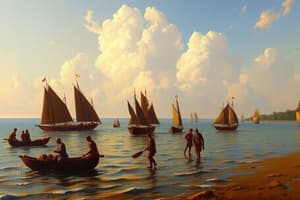Podcast
Questions and Answers
Which indigenous group primarily inhabited the Greater Antilles?
Which indigenous group primarily inhabited the Greater Antilles?
- Spanish colonists
- Arawak (Taino) (correct)
- Caribs
- French settlers
What was one significant impact of European colonization on the indigenous populations of the Caribbean?
What was one significant impact of European colonization on the indigenous populations of the Caribbean?
- Adoption of European agricultural practices
- Population increase due to migration
- Population decline due to disease and violence (correct)
- Development of indigenous political structures
Which of the following crops was introduced to the Caribbean during the Spanish colonization?
Which of the following crops was introduced to the Caribbean during the Spanish colonization?
- Rice
- Cotton
- Wheat
- Sugarcane (correct)
What was the primary economic backbone of the Caribbean islands during colonization?
What was the primary economic backbone of the Caribbean islands during colonization?
How did the arrival of European powers affect cultural identity in the Caribbean?
How did the arrival of European powers affect cultural identity in the Caribbean?
Flashcards
Who were the Arawak (Taino)?
Who were the Arawak (Taino)?
One of the first groups in the Caribbean, known for peaceful agriculture in the Greater Antilles.
Who were the Caribs?
Who were the Caribs?
A warrior society inhabiting the Lesser Antilles, noted for resisting European colonization.
Who was Christopher Columbus?
Who was Christopher Columbus?
1492 arrival marked European interest; claimed lands for Spain, introducing new crops and livestock.
What was the impact of colonization?
What was the impact of colonization?
Signup and view all the flashcards
What is the legacy of colonization?
What is the legacy of colonization?
Signup and view all the flashcards
Study Notes
Early Settlers in the Caribbean
Indigenous Peoples
- Arawak (Taino): One of the first groups to inhabit the Caribbean, primarily in the Greater Antilles.
- Caribs: Known for their warrior society; they inhabited the Lesser Antilles and are noted for their resistance to European colonization.
- Culture: Indigenous groups practiced agriculture, fishing, and hunting, with complex social structures and spiritual beliefs tied to the natural world.
European Exploration and Settlement
- Christopher Columbus: His arrival in 1492 marked the beginning of European interest in the Caribbean. He made several voyages, claiming lands for Spain.
- Spanish Colonization:
- Early settlements established on islands like Hispaniola, Puerto Rico, and Cuba.
- Introduction of crops, livestock, and sugarcane, leading to economic exploitation.
- Other European Powers:
- French and British: Entered the Caribbean in the 17th century, establishing colonies in the Lesser Antilles (e.g., Saint-Domingue, Barbados).
- Dutch: Established trading posts and colonies in regions like Curacao and Aruba.
Impacts of Colonization
- Population Decline: Indigenous populations drastically reduced due to disease, violence, and enslavement.
- Slave Trade: African slaves were forcibly brought to work on sugar plantations, which became the economic backbone of the Caribbean islands.
- Cultural Blending: African, European, and Indigenous cultures mixed, creating unique Caribbean identities, traditions, and languages.
Legacy
- Economic Foundations: Sugar and tobacco cultivation led to the establishment of plantation economies, heavily reliant on slavery.
- Cultural Heritage: The fusion of diverse cultures has influenced music, dance, and cuisine in contemporary Caribbean societies.
- Political Structures: Colonial administration set the stage for future governmental frameworks and independence movements in the 20th century.
Indigenous Peoples of the Caribbean
- The Arawak (Taino) were one of the first groups to inhabit the Caribbean, primarily in the Greater Antilles, known for their peaceful nature and agricultural skills.
- The Caribs, a fierce warrior society, inhabited the Lesser Antilles and were known for resisting European colonization.
- Indigenous groups practiced agriculture, fishing, and hunting, with elaborate social structures and spiritual beliefs deeply connected to nature.
European Exploration and Settlement
- Christopher Columbus' arrival in 1492 marked the beginning of European interest in the Caribbean, claiming lands for Spain.
- Spanish colonization led to the establishment of settlements on islands like Hispaniola, Puerto Rico, and Cuba, introducing crops, livestock, and sugarcane, which led to economic exploitation.
- Other European powers, including the French, British, and Dutch, followed in the 17th century, establishing colonies in the Lesser Antilles and trading posts in various regions.
Impacts of Colonization
- Indigenous populations suffered a drastic decline due to diseases, violence, and forced labor.
- The African slave trade became integral to the Caribbean economy, as slaves were brought to work on sugar plantations, contributing to the region's wealth.
- A unique cultural blending emerged from the mixture of African, European, and Indigenous cultures, resulting in distinct Caribbean identities, traditions, and languages.
Legacy of Colonization
- The sugar and tobacco-based plantation economies created an economic foundation heavily reliant on slave labor.
- The fusion of diverse cultures continues to influence contemporary Caribbean music, dance, and cuisine.
- Colonial administration laid the groundwork for future governmental frameworks and independence movements in the 20th century.
Studying That Suits You
Use AI to generate personalized quizzes and flashcards to suit your learning preferences.




